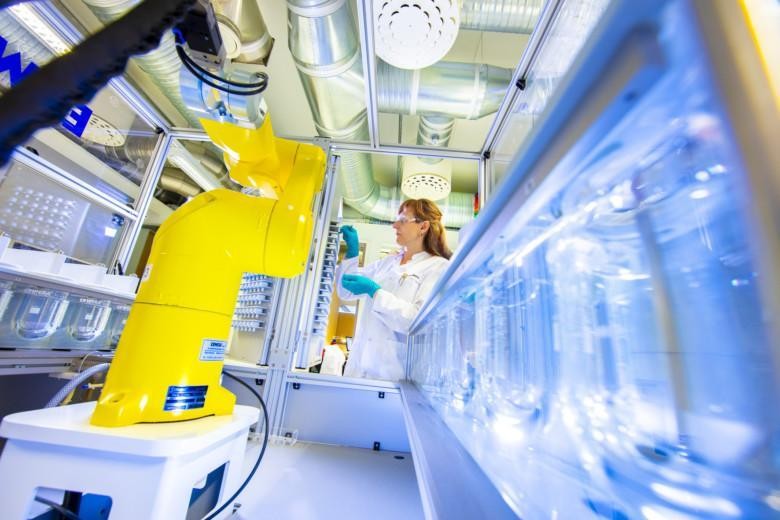Bayer and Turku University of Applied Sciences are investing in a strategic partnership
Bayer and Turku University of Applied Sciences have entered into a comprehensive and long-term strategic partnership agreement with the aim of strengthening and developing research and education collaboration in many different areas.
One of the important goals emphasized in the partnership is to bring the world of education and business closer together by developing degree programs that meet future skills needs and provide students with a route to working life. This autumn, collaboration was deepened, and concrete work was started in both production and product development areas in Turku.

The collaboration between Bayer and Turku University of Applied Sciences that has been going on for years was raised to a new level when the parties signed a strategic partnership agreement in spring 2021. This is Bayer Finland’s third* strategic collaboration agreement with a university. Strategic collaboration strengthens the existing forms of collaboration between Bayer and Turku University of Applied Sciences, creates new ones and develops new kinds of content for education.
– We want to maintain a continuous dialogue with universities in order to develop competencies in the Turku region and in the whole of Finland. The partnership emphasizes future skills needs and develops corresponding solutions for degree programs. In this way, we can ensure the supply of skilled workers also in future and provide a route to working life, says Tomi Penttilä, Head of Bayer’s Product Supply Center in Turku.
– A strategic partnership with a globally recognized top performer like Bayer creates significant opportunities for Turku University of Applied Sciences to raise the level of expertise in the region, says Vesa Taatila, Rector and President of Turku University of Applied Sciences.
– The agreement process with Bayer showed that we already have a number of collaboration initiatives underway. With the agreement, various activities are brought together, and our collaboration will be further strengthened. In particular, I look forward to the joint development of education and new openings in research and development, which will certainly be reflected in the daily lives of students as new opportunities, says Dean Juha Kontio from the Faculty of Engineering and Business at Turku University of Applied Sciences.
International networks and reshaping areas of special expertise
Bayer and Turku University of Applied Sciences are constantly developing operational models related to the partnership. The current forms of collaboration include guest lectures, workshops, internships and thesis assignments, mentoring and lectures held by experts. In addition, work management training as well as test laboratories and a digital factory that serve as multi-learning environments are being planned. The partnership also includes opportunities for continuous learning, such as additional training, for Bayer personnel.
– As a global company, we can offer international networks and rapidly evolving business and competence areas that create excellent opportunities for future experts. The management of special areas of expertise in the pharmaceutical industry, such as GMP (Good Manufacturing Practice), international regulation, and drug development technology, opens many doors. We also benefit from good project management skills, Penttilä says.
– We want to diversify and deepen our collaboration with Turku University of Applied Sciences by introducing students to the working methods of the pharmaceutical industry, for example to new therapies and dosing systems, 3D printing as well as machine learning and the use of supercomputers, explains Pirjo Kortesuo, Head of Formulation Development in Turku.
Digitization, automation and robotics in future technologies
The workshops held this autumn identified deep-dive areas for collaboration, and collaborative operations got properly underway.
– Collaboration will be deepened in the five areas identified, including computational engineering, future interactive technologies, smart machines, new materials and processes, and design thinking. The development of robotics and automation, as well as various equipment technologies, are important areas of expertise for future, and new models for collaboration will be charted in the next workshops, Kortesuo says.
– We believe that promoting collaboration between the worlds of education and business is beneficial for all actors: in this way we can better utilize intelligent thinking and increase human capital, which is an advantage for both Turku and Finland as well as for Bayer from a global perspective, Penttilä summarizes.
– The success of the Turku region is built through future experts. Therefore, it is important that collaboration between business life, universities and the city works, it is invested in and common interfaces are identified. Open and wide-ranging interaction is needed in order to further increase the vitality and competitiveness of the Turku region. The strategic partnership between Bayer and Turku University of Applied Sciences is a great example of how, with common will and investment, educational programs can be developed that meet real needs and thus provide a concrete route to working life, says Mayor of Turku, Minna Arve.
